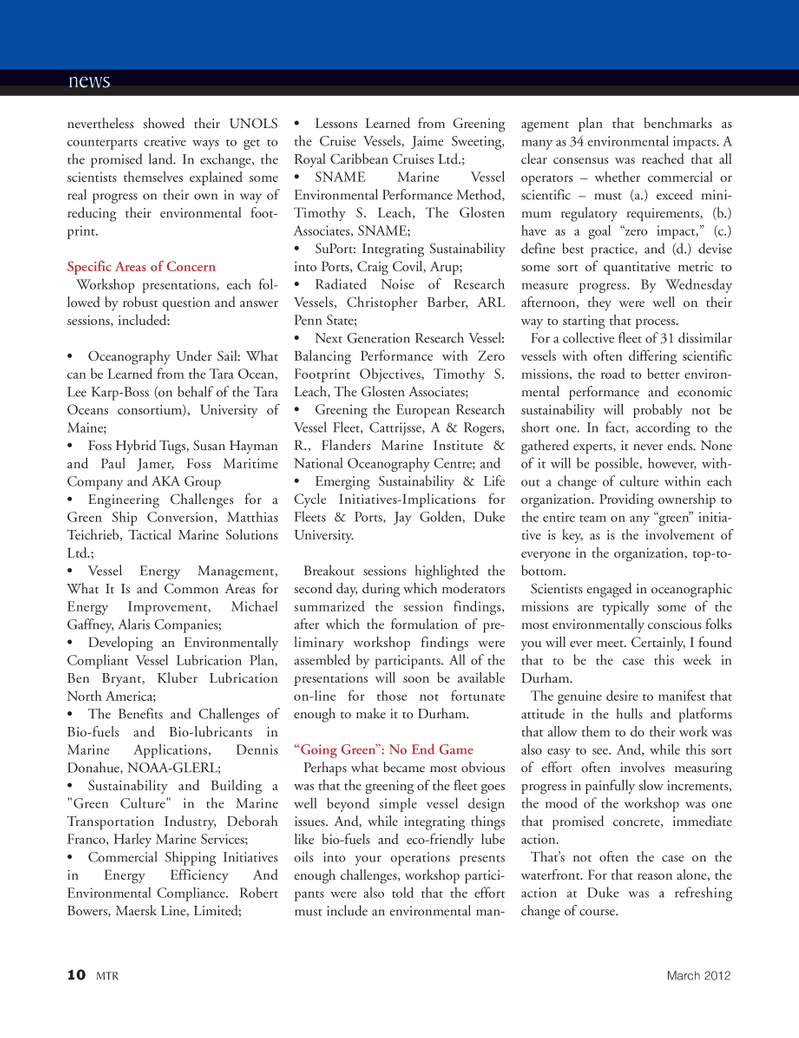
Page 10: of Marine Technology Magazine (March 2012)
Subsea Vehicle Report – Unmanned Underwater Systems
Read this page in Pdf, Flash or Html5 edition of March 2012 Marine Technology Magazine
news10MTRMarch 2012 nevertheless showed their UNOLS counterparts creative ways to get to the promised land. In exchange, the scientists themselves explained some real progress on their own in way of reducing their environmental foot- print. Specific Areas of Concern Workshop presentations, each fol- lowed by robust question and answer sessions, included:Oceanography Under Sail: What can be Learned from the Tara Ocean, Lee Karp-Boss (on behalf of the Tara Oceans consortium), University of Maine; Foss Hybrid Tugs, Susan Hayman and Paul Jamer, Foss Maritime Company and AKA Group Engineering Challenges for a Green Ship Conversion, Matthias Teichrieb, Tactical Marine Solutions Ltd.;Vessel Energy Management, What It Is and Common Areas for Energy Improvement, Michael Gaffney, Alaris Companies; Developing an Environmentally Compliant Vessel Lubrication Plan, Ben Bryant, Kluber Lubrication North America; The Benefits and Challenges of Bio-fuels and Bio-lubricants in Marine Applications, Dennis Donahue, NOAA-GLERL; Sustainability and Building a "Green Culture" in the Marine Transportation Industry, Deborah Franco, Harley Marine Services; Commercial Shipping Initiatives in Energy Efficiency And Environmental Compliance. Robert Bowers, Maersk Line, Limited; Lessons Learned from Greening the Cruise Vessels, Jaime Sweeting, Royal Caribbean Cruises Ltd.; SNAME Marine Vessel Environmental Performance Method, Timothy S. Leach, The Glosten Associates, SNAME;SuPort: Integrating Sustainability into Ports, Craig Covil, Arup; Radiated Noise of Research Vessels, Christopher Barber, ARL Penn State; Next Generation Research Vessel: Balancing Performance with Zero Footprint Objectives, Timothy S. Leach, The Glosten Associates; Greening the European Research Vessel Fleet, Cattrijsse, A & Rogers, R., Flanders Marine Institute & National Oceanography Centre; and Emerging Sustainability & Life Cycle Initiatives-Implications for Fleets & Ports, Jay Golden, Duke University. Breakout sessions highlighted the second day, during which moderators summarized the session findings, after which the formulation of pre- liminary workshop findings were assembled by participants. All of the presentations will soon be available on-line for those not fortunate enough to make it to Durham. ?Going Green?: No End Game Perhaps what became most obvious was that the greening of the fleet goeswell beyond simple vessel design issues. And, while integrating thingslike bio-fuels and eco-friendly lubeoils into your operations presents enough challenges, workshop partici- pants were also told that the effort must include an environmental man- agement plan that benchmarks as many as 34 environmental impacts. A clear consensus was reached that all operators ? whether commercial or scientific ? must (a.) exceed mini- mum regulatory requirements, (b.) have as a goal ?zero impact,? (c.) define best practice, and (d.) devisesome sort of quantitative metric to measure progress. By Wednesday afternoon, they were well on their way to starting that process. For a collective fleet of 31 dissimilar vessels with often differing scientific missions, the road to better environ- mental performance and economic sustainability will probably not be short one. In fact, according to the gathered experts, it never ends. None of it will be possible, however, with- out a change of culture within each organization. Providing ownership to the entire team on any ?green? initia- tive is key, as is the involvement of everyone in the organization, top-to- bottom.Scientists engaged in oceanographicmissions are typically some of the most environmentally conscious folks you will ever meet. Certainly, I found that to be the case this week in Durham. The genuine desire to manifest that attitude in the hulls and platformsthat allow them to do their work was also easy to see. And, while this sort of effort often involves measuring progress in painfully slow increments, the mood of the workshop was one that promised concrete, immediate action. That?s not often the case on the waterfront. For that reason alone, the action at Duke was a refreshing change of course. MTR#2 (1-17):MTR Layouts 2/21/2012 10:04 AM Page 10

 9
9

 11
11
